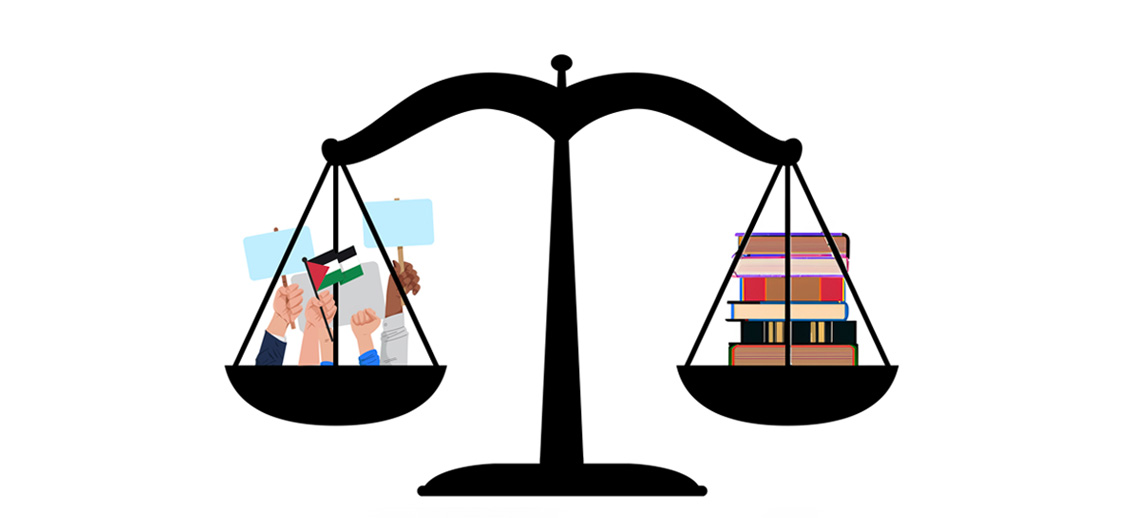Grieving Gaza
While it took the world some time to catch on to the ongoing genocide, our student body was wiser.
If I were not a student at the University of Toronto Mississauga (UTM), I don’t know how I could have handled last year. UTM gets a bit of a bad rep in my opinion. People say that there is not much happening. Yes, there is a community, but it is a commuter school where people do not overly invest in anything outside of academics, and perhaps a few student clubs for the sake of their resume. In short, the implicit impression people receive from many UTM students is that they are suburban careerists who like to minimize their risks.
There is some truth to that statement, seeing as UTM’s student caucus comprises of many immigrants—many leaving political turmoil behind—who are seeking a better life. But it is specifically this trait about Mississauga that creates empathy in its residents.
In recent years, many fleeing the wars of Syria and Ukraine have resettled in the city. To Mississauga, war is not an abstraction that lives and dies in the newsfeed. It presents itself in the stories of the members of our communities. We may not outwardly show it, but political conflict is at the core of who we are, and many of us are sensitive to it.
In my experience, this sensitivity has made UTM a safe space to mourn the ongoing genocide in Gaza, and it has been from the beginning. While the world was still debating the validity of ‘the proportionality’ of Israeli response to the events of October 7th, my fellow students at UTM and I could mourn without having to explain ourselves at a time when anti-Palestinian sentiments ran high.
At the start of the genocide, the Association of Palestinian Students (APS) on campus organized a Keffiyeh week. The student club called on UTM students to show up to school wearing a Keffiyeh, a headscarf worn throughout the Middle East and North Africa, that increasingly symbolizes solidarity with Palestinian calls for liberation. I, and many others, participated by wearing our Keffiyeh and while it was a grim time overall, it filled me with pride to show up to campus and know that we had each other’s backs.
I wore my Keffiyeh everywhere I went, including the St. George campus in downtown Toronto. While wearing the scarf made me feel safe in UTM, the stares I received by many fellow students in St. George reminded me that the world still had a bit of catching up to do. Again, political pundits like Piers Morgan were fixated on getting anyone and everyone to condemn the actions of Hamas, and it would be a few months before the ICJ ruled that it was plausible that a genocide was occurring in Gaza. Scholars such as Raz Segal, an Associate Professor of Holocaust and Genocide Studies at Stockton University, who stated it was indeed a genocide, couldn’t pierce the veil of Anti-Palestinian and Anti-Arab rhetoric that ran rampant in Western media. I was reminded that the safety on our campus was not something to take for granted.
While we, the students, gave each other safety, I cannot say the same for the administration. Many professors I have spoken to on campus did not support the genocide. Professors wanted to help their Arab students—many of whom could not show up to class due to the events—but could not outwardly speak on the issue for fear of administrative backlash. After all, this is the same administration which rescinded a job offer from Valentina Azarova, an international legal practitioner and scholar, for her work on human rights abuses by the Israeli government. Many professor’s contracts and lack of tenure, coupled with the culture of the administration, forced professors to choose between supporting their students and maintaining their livelihood. Still, many professors accommodated and assisted students in the ways they can, offering counselling and circles of discussion.
Last but certainly not least, one cannot forget that the UTMSU issued a statement of solidarity with Palestinians. It is a statement that executives have paid dearly for, but one that made all the difference for me and many of my fellow students. While we still have a long way to go, and it looks like there is no end in sight to the atrocities committed in Gaza, I am grateful that I did not have to swallow my grief for empathizing with those going through a genocide.

